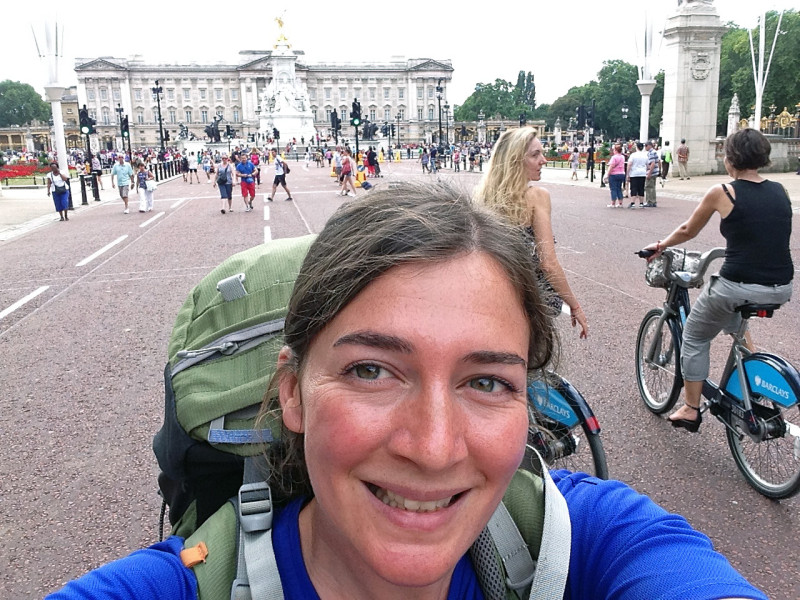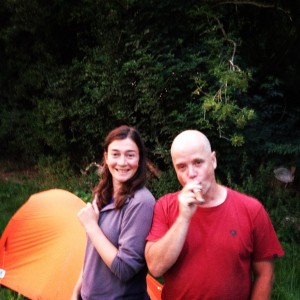Rediscovering England
By
Georgia Villalobos
I’m sat in a café in Northumberland with the local sing-song accent dancing around me. Northumberland is a county in England but that few English can locate on a map; a county that claims to be home to England’s last wilderness and where people relish the freedom they have compared to much of the rest of country. It’s the same Northumberland I left 3 months ago but it’s a Northumberland I’m seeing with new eyes, new post-Expedition-England-eyes. I seem to have developed this habitat of sizing up most people I meet- ‘yep, they’d definitely help us’ or eyeing up their garden- ‘definitely big enough for tents’ and, well, the pavements here would be a nightmare for the pram but the views would be fabulous. Dana would like that playground but she’d definitely end up half way up that tree next to it.
I’ve come to the café to work as I got a request from Mikael to write this final article from me summarising my experiences of the journey we took during Expedition England. Not an easy task! It’s only a fortnight since we finished but I’ve already rewalked the journey in my mind a few times, remembering people and places, patterns emerging that I hadn’t recognised at first and realising new things. Rediscovering England- or my England as it were.
One of the most interesting elements to walking across my homeland for me was walking with a foreigner. I wouldn’t have learnt or realised nearly as much had I walked with another English person. For instance I would not have recognised what a strange relationship we English have with the land, and when I say the land I mean the earth that is under our feet. Mikael and Dana felt like they had a right to be out in nature; the notion of asking if we could camp on farm land was quite amusing to Mikael who took the attitude- who has the right to tell another human being they cannot camp on a piece of land? Everywhere we went asking people where we could camp the answer was inevitably the same; that wild camping is illegal in England. In England every single last piece of land is owned, even the land that encompasses the national parks is privately owned with public footpaths running through it. All the hedges that caused us so many problems with oncoming cars represent field boundaries and hundreds of years of land ownership and land management. Even as we walked in to the Hope Valley at the beginning of the trip and looked across the valley all we could see was fields and field boundaries. When walking we came across sign after sign saying ‘Private’ or ‘Trespassers will be prosecuted’, Mikael found this funny- at first- and took photos of the signs. My overwhelming impression from the trip is of how detached we English are on the whole, from the land underneath our feet. The green spaces that are available are so often empty; one hour in to our walk out of Moss side and we were walking along an empty riverside. No one was using it. We saw this all along the trip; under used green spaces, canals and riversides. I say that Northumberland has the last English wilderness but to be honest I think the concept of Wilderness is beyond our realm of understanding. We don’t miss it because we don’t even know that it’s missing. This was really driven home to me walking with someone from another country where the God given right to access nature is part of the national psyche. They even have a word for it- ? I’ve been thinking about the reasons for this difference in approach and I’ve been wondering if its down to the fact that we are simply busting at the seams? We have a huge population for the amount of land available. Is wilderness possible when you have over 55 million people living in just over 50 thousand square miles? Those numbers are actually breath taking when you consider them. And from what we saw whilst walking, England is actually managing quite well under this enormous strain. How on earth do we keep it together?
British tolerance is a wonderful thing. England is an incredibly multicultural place. This was not a new idea to me or to many English people but walking across the country meeting so many different people I realised how much of a winning lottery ticket we’re sitting on as a nation. I really enjoyed visiting Leicester and Birmingham, particularly Leicester, as these places are brimming with energy, enthusiasm and ideas. And you can feel it on the streets. These places have an real energy to them. We saw an array of cultures thriving as we crossed England but also we saw alternative cultures thriving. We met people living on canals boats- or the ‘nomads of the water’ as one person living on the canal near Hemel Hempstead said. We did a long interview with a lady living on the canal at Oxford who was actually Scandinavian. She explicitly mentioned how she had been surprised how alternative cultures were much more accepted in England than in other countries, and I was proud to hear this. This is a good thing. We also stayed a night with an alternative community, living in a mansion near Leighton Buzzard -I would find this lifestyle challenging but I’m pleased that there is the space in English society and national psyche for this to exist.
There is however a downside that I can see. Along with British tolerance comes British privacy; a ‘you get on with your thing and I’ll get on with my thing’ approach. From what I’ve observed during Expedition England and the interviews Mikael undertook, I can see a lot of self imposed segregation existing. People living in the same city or town or even street that live parallel lives and don’t mix. This is a generalisation of course- we didn’t visit a lot of places in England but the places that we did visit I was surprised by this segregation. (I hadn’t realised this still existed before the trip but now I see this is not a new idea for many people- one of the thinktanks have coined the phrase ‘interculturalism’ (or a lack of it in our case)- the mixing of cultures in the public domain without the loss of cultural identity.) Mikael interviewed a good friend of mine, Mo, who talked about growing up in a Somali community when London is supposed to lead the way on cultures living together. One man we met in Birmingham said he really liked living in England compared to Denmark because ‘ the English are not nosey, they just let you get on with your business and your way of life.’ The Expedition England team went for a curry on Leicester’s Golden mile and we were the only white people who had ventured in. English privacy was something we came across the whole journey from people from all ethnicities and social classes and gender; people watching us but not actually speaking to us. Whilst English tolerance and privacy enables a variety of lifestyles and cultures to thrive, it seems to me through having taken part in Expedition England that this generation and the next have another transition to negotiate to change this? How should we do it?
Listening to so many different people being interviewed gave a fascinating insight into the national character and all the quirks that are common to the English. For instance I realised how nuanced English communication is. In conversation with an English person, so much of what is communicated is not actually spoken out loud. It is inferred or suggested. Which makes us really challenging to interview. We also don’t say what we mean. A lot. We have a standard set of phrases that say one thing but mean something completely different- and everyone living in England uses and understands these phrases as if they were a second language. For instance near Hemel Hempstead we camped on church land and asked the vicar there if we could interview her. She replied ‘I’ll see how I feel later, if I’ve got time.’ Which I took as ‘Nope, never – not even in a month of Sundays.’ So I was surprised when a couple of hours later Mikael looked disappointed and said ‘It doesn’t look like the vicar is coming for her interview.’ No, she isn’t, and she never was. This happened all the time and made me realise a few things about the English; they don’t like conflict and they don’t like disappointing people. So this English quirk is absolutely infuriating but it comes from a relatively well-meant place.
Another English quirk we came across all the time was the culture of not ‘blowing your own trumpet’ – meaning that you shouldn’t show off or promote yourself. So many times we started to talk to people and they had strong opinions about what we were discussing, but as soon as they were asked to talk on camera they couldn’t get away fast enough. The English tend to express opinions in private with close friends and family but not in public unless the matter is very important. I actually don’t mind this quietly spoken quality (Global English translation: I love it)- for me it helps to filter out what is very important from what is not important. I did notice, however, that this seems to be applied a lot more to women. Coming from a stereotypical matriarchal northern family, a family full of ferocious women I found it fascinating that actually hardly any women would speak on camera during the first two months, but men would. Does this cultural quirk of not ‘blowing your own trumpet,’ not promoting yourself or not speaking out in public apply more to women than to men in England? Do English women self-sensor in order to not appear ‘un-ladylike’? When at Mansfield college I asked this question to one of the women Mikael interviewed, she replied ‘I think its because its seen as a bit distasteful to promote yourself or your opinions.’
The English are also generous and warm people. Yes, you read that correctly- generous, warm. We interviewed a woman living in Oxford running her own theatre company, who summed it up perfectly for me: ‘The English need a good chance to warm up- but its there. They want to help.’ And we could see this as we asked for help in various places. Initially people were a little cold and distrustful but as they heard our story and got to know us a little they wanted to help. What would start out as a suspicious hello would end up as cups of tea, a hot shower and someone building us a fire in their back garden. (Interestingly if people walked out of their houses before we had knocked asking “May I help you?” with a forced smile on their face this was bad news. This greeting always meant – global English- ‘Please leave now.’ This only happened twice though) The English need time to unfold their layers I found, but once they ‘let you in’ they have a big capacity for generosity. Cold hands, warm heart.
To finish I’d like to point out that the English don’t actually know how to answer the question ‘Who are the English, what are they like?’ And that says a lot in itself. So many people could not answer this question when Mikael asked them and I’ve realised that I always struggled to answer this question too. I think this is because I was trying to give an answer that would encompass everyone living in England, which as we’ve discussed would be impossible to some up. When I ask myself what are the English like answering as a white middle class woman from the north of England, I’m much more to the point: We’re tolerant, easy going, resilient and take time to open up. The people who did answer the question confidently seemed to be specifically referring to their version of English. In London we interviewed a soldier who was extremely succinct, he knew the answer because he was describing his England. People who couldn’t answer were trying to answer for everyone. Who are the English? Has been such a hot topic recently in the wake of the Trojan horse scandal. English schools are being asked to teach ‘British values’ and the generally quiet English have actually yelled back for once ‘What on Earth are British values?!’ Team Expedition England went to a public meeting in Birmingham analysing the way forward for Birmingham schools after the Trojan horse scandal. One of the speakers summed up the matter perfectly for me ‘British values? How about human values? Surely a country like England needs to be thinking in those terms.
*This was our route on http://punkt.luxson.com/daddyadventurer/
*PHOTOALBUM FROM THE JOURNEY Here!












Love you, Georgia 🙂
Hi sir, these is sujeet from india. Recently i read a lot about u and what all activities u do and the places u go on exploring. All these simply excites me a lot.Currently i am pursuing my bachelor degree in mechanical engg but just getting fed up with it as i am not able to put my interest in it. But yes i always think of doing something different and also i am an adventurous guy.So kindly enlist some stepping stones to become an explorer. I would be very much grateful to u.